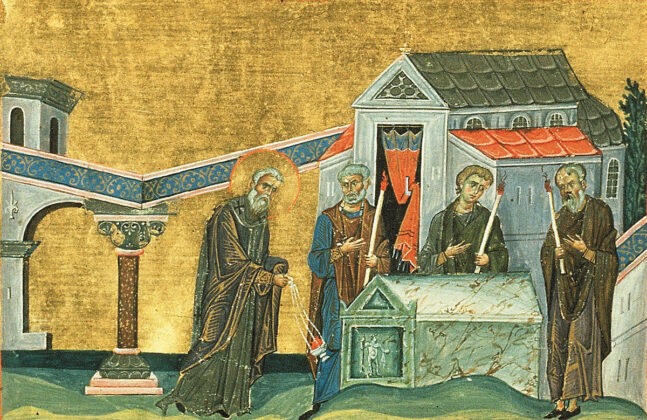6th Sunday in Ordinary Time
See also:
Mass Readings
First Reading – Jer 17:5-8
Thus says the LORD: Cursed is the one who trusts in human beings, who seeks his strength in flesh, whose heart turns away from the LORD. He is like a barren bush in the desert that enjoys no change of season, but stands in a lava waste, a salt and empty earth. Blessed is the one who trusts in the LORD, whose hope is the LORD. He is like a tree planted beside the waters that stretches out its roots to the stream: it fears not the heat when it comes; its leaves stay green; in the year of drought it shows no distress, but still bears fruit.
Responsorial Psalm – Ps 1:1-2, 3, 4 & 6 (R.40:5a)
R. Blessed are they who hope in the Lord.
Blessed the man who follows not
the counsel of the wicked,
nor walks in the way of sinners,
nor sits in the company of the insolent,
but delights in the law of the LORD
and meditates on his law day and night. R.
He is like a tree
planted near running water,
that yields its fruit in due season,
and whose leaves never fade.
Whatever he does, prospers. R.
Not so the wicked, not so;
they are like chaff which the wind drives away.
For the LORD watches over the way of the just,
but the way of the wicked vanishes. R.
Second Reading – 1 Cor 15:12, 16-20
Brothers and sisters: If Christ is preached as raised from the dead, how can some among you say there is no resurrection of the dead? If the dead are not raised, neither has Christ been raised, and if Christ has not been raised, your faith is vain; you are still in your sins. Then those who have fallen asleep in Christ have perished. If for this life only we have hoped in Christ, we are the most pitiable people of all. But now Christ has been raised from the dead, the firstfruits of those who have fallen asleep.
Gospel – Lk 6:17, 20-26
Jesus came down with the Twelve and stood on a stretch of level ground with a great crowd of his disciples and a large number of the people from all Judea and Jerusalem and the coastal region of Tyre and Sidon. And raising his eyes toward his disciples he said: “Blessed are you who are poor, for the kingdom of God is yours. Blessed are you who are now hungry, for you will be satisfied. Blessed are you who are now weeping, for you will laugh. Blessed are you when people hate you, and when they exclude and insult you, and denounce your name as evil on account of the Son of Man. Rejoice and leap for joy on that day! Behold, your reward will be great in heaven. For their ancestors treated the prophets in the same way. But woe to you who are rich, for you have received your consolation. Woe to you who are filled now, for you will be hungry. Woe to you who laugh now, for you will grieve and weep. Woe to you when all speak well of you, for their ancestors treated the false prophets in this way.”
Featured Saints
St. Juliana of Nicomedia, virgin and martyr (†fourth century). She was the only Christian in her family, in Nicomedia (Turkey). At 18, having refused to marry a pagan, she was imprisoned and later beheaded.
St. Maruthas, bishop (†a. 420). He presided the Council of Seleucia, restored the churches ruined in the persecutions of King Shapur and collected relics of the martyrs of Persia for veneration in his episcopal See, present-day Silvan, Turkey, which came to be called Martyropolis.
Blessed Nicholas Puglia, priest (+1256). Upon hearing St. Dominic preach in Bologna, he entered the Dominican Order, and became a most faithful companion of his founder. He drew many vocations to the Order and and founded the monastery of Trani and Perugia, where he died.
Blessed Joseph Allamano, priest (†1926). Animated by untiring zeal, he founded the two Congregations of the Missions of the Consolata in Italy: one for men and another for women.
Blessed Francis Toyama Jintaro, martyr (†1624). Samurai noble whose exemplary Christian life was a key factor in the conversion of many people. He was beheaded in Hiroshima, Japan for refusing to renounce the Faith.
Blessed Philippa Mareri, virgin (†1236). Of noble origin, she abandoned worldly riches and splendour, choosing to live on a property belonging to her family in Borgo San Pietro, Italy, following St. Clare’s way of life.









